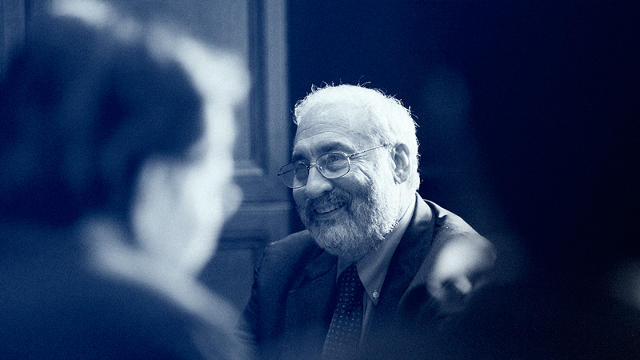The Democrats’ Favorite, Nobel-Winning Economist On How To Reduce Income Inequality
The message of Joseph Stiglitz’s book—The Great Divide: Unequal Societies and What We Can Do About Them (out now in paperback)—is positive, in a way. He shows how growing income and wealth inequality is the function of choices we make, not ineluctable forces—globalization, technology, capitalism—that we can’t control. Although we don’t have policies in place to create more equality, we could design them if we wanted. After all, other countries are buffeted by exactly the same forces (that’s why it’s called globalization), yet, they don’t have anything like our gaps between rich and poor.
Stiglitz is a professor at Columbia, a Nobel laureate in economics, and respected by both Democratic candidates. Senator Sanders has spoken of Stiglitz as an influence. Clinton calls Stiglitz an “adviser” (someone she “talks to”). Stiglitz is in the upper ranks of progressive economists, and he’s more in demand this election year now that issues like equality are on the agenda.
The book, which collects the writing Stiglitz has done on inequality since the financial crisis, gives dozens of reasons why the 1% is gaining at the expense of others. The Bush-era tax cuts. Rampant tax evasion by corporations. A regressive tax system whereby people earning income from capital gains and dividends often pay less than wage earners. A lack of economic regulation, such that CEOs effectively set their own rates of pay, and how market power is increasingly concentrated in many industries. And so on.

Stiglitz does, though, see two reasons for optimism about inequality. The first is the national movement to raise the minimum wage to at least $15 an hour. The second is that inequality is much higher up the political agenda than it used to be. “A positive note is that this has entered into to the political discourse,” he says.
Last year, Stiglitz produced a report containing ideas that could be part of Hillary’s economic platform (according to the New York Times anyway). The report for the Roosevelt Institute proposed changing capital gains tax rules to discourage short-termism in the markets, a crackdown on corporate tax avoidance, a more progressive income tax scale, and financial transaction taxes.
Getting these tax changes passed will be difficult. But Stiglitz is buoyed that people are recognizing income inequality as an economic issue, as well as a moral one. “It’s really an idea that has moved into the mainstream,” he says. “When you have high levels of inequality, it means those at the bottom-end are not getting the skills they need to realize their potential. [People are realizing] that we’re wasting our most valuable resource: our human resource.”
In response to those who say that our economy, which is producing billion-dollar companies seemingly at will, Stiglitz explains “the innovation enigma.” This is the phenomenon whereby an economy can be innovative, but still not create prosperity for large numbers of people:
“Around the world, there is enormous enthusiasm for the type of technological innovation symbolized by Silicon Valley,” he writes. “In this view, America’s ingenuity represents its true comparative advantage, which others strive to imitate. But there is a puzzle: It is difficult to detect the benefits of this innovation in GDP statistics.”
This could be because GDP is not a good measure of prosperity, failing to capture the benefits we get from free services like Google or Facebook. But it could also be that “the profitability of an innovation may not be a good measure of its net contribution to our standard of living.” The innovation of Silicon Valley, or Wall Street for that matter, benefits the people who make it, but not the wider population:
In our winner-takes-all economy, an innovator who develops a better Web site for online dog-food purchases and deliveries may attract everyone around the world who uses the Internet to order dog food, making enormous profits in the process. But ..[the] Web site’s net contribution to economic growth may in fact be relatively small.
But, unlike other economists, Stiglitz isn’t fatalistic about technology leading necessarily to dog food sites and narrow prosperity gains. We could, in fact, incentivize innovators to work on more important things.
“We’ve been taking our scarce research talent and thinking ‘how can we create more unemployment’,” he says in an interview. “We’ve said ‘how do we reduce our need for unskilled labor?’ in an era when we already have high unskilled labor employment.”
Silicon Valley in other words is preoccupied with labor-saving technology—whether it’s robots or Pets.com—at a time when it should be preoccupied with challenges like climate change.
“I think we should be using those scarce resources to preserve the planet. But we don’t give [innovators] any incentives,” he says. “We don’t have a price on carbon, so why should they try to save carbon emissions? And interest rates are at zero when the cost of labor is higher than zero. That gives firms incentives to focus on labor, and not on capital, or the environment. It’s a funny kind of market economy.”
Fast Company , Read Full Story
(36)














